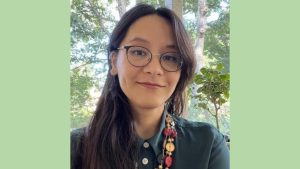By Anna Blackburn, Graduate Writer
The DOECL is excited to welcome Dr. Sarah Leilani Parijs as a Postdoctoral Research Associate through the Carolina Postdoctoral Program for Faculty Diversity. Dr. Parijs holds a PhD in English with a minor in Literature and Science from Indiana University Bloomington as well as an MA in English from the University of Texas at Arlington. She studies American literature, specifically nineteenth-century nature writing and contemporary science fiction. Read on to learn more about Dr. Parijs:
What are you most excited about at UNC?
I am most excited about working with and learning from UNC’s vibrant community of interdisciplinary scholars and teachers in fields including ecocriticism, postcolonialism, health sciences and science studies, American literature, and science fiction studies. For example, I am looking forward to getting involved with the HHIVE Lab and exploring the Special Collections at the Wilson Library. I am also excited to teach an undergraduate course in Spring 2024 within the ECL Department, which focuses on literary responses to the Space Race in postcolonial science fiction’s imagination of futurity.
What is a project you’re currently working on?
I am currently working on a book manuscript project tentatively titled Allegories of Decay in Gaia: Writing an Interconnected Worlds of Parts in American Nature Writing and Science Fiction. In response to mounting ecological crises, Allegories of Decay in Gaia reveals the conceptual and historical ties between race, coloniality, and nature in the figure of Gaia, or the Earth as a living, ecological system through allegoresis, or allegorical interpretation. Looking across 200-years of American nature writing, from natural science and the Transcendentalist movement to contemporary Black science fiction, this study complicates the association of wholeness with environmental health and partiality or fragmentation with environmental harm. Planetary holism, as I demonstrate, relies on a symbolic form of human omniscience associated with the colonial period to see the planet as separate from ecological and cultural decay. My study contends that the intertwined role of colonialism, mysticism, and ecological science associated with Gaia theory in American history reveal a failure in imagining an inclusive form of Earth animacy. Yet this study suggests that a decolonial Gaia has the potential to reinvent and repurpose ecological experiences of brokenness for a new kind of holistic, interspecies ethics.
What is a piece of media you are interested in right now?
In my down time, I am an anime and fantasy enthusiast. For people interested in environmentalism and estrangement (via magic and/or the role of science and technology), I recommend Katsuhiro Otomo’s 1988 cyberpunk film classic Akira and Meredith Ann Pierce’s little-known Darkangel YA fantasy trilogy.
Learn more about Professor Parijs here.


